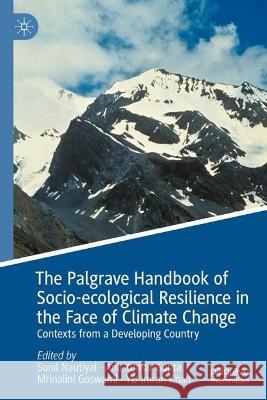Palgrave Handbook of Socio-ecological Resilience in the Face of Climate Change: Contexts from a Developing Country » książka
Palgrave Handbook of Socio-ecological Resilience in the Face of Climate Change: Contexts from a Developing Country
ISBN-13: 9789819922055 / Angielski
The book shares experiences, exchange knowledge on adaptation and risk reduction strategies, communities' responses and best practices. It provides insights into climate change risk reduction in trans-disciplinary contexts. Climate change is real and causing detectable shifts in the various components of the biosphere. It has the potential to drastically alter or eliminate certain ecosystem services (ES) and can exert severe consequences in viewpoint of delivery of ES, for which substitutes usually are costly or unavailable to the vulnerable societies. The climate related disasters affect economy, ecology and society. India is one of the most highly risk-prone countries to climate change and geo-climatic variations of the country make the population vulnerable to climate related disasters in varied degrees, intensities and patterns. India needs to be concerned about the impacts of climate change because a large portion of its population depends on climate-sensitive sectors.
The book shares experiences, exchange knowledge on adaptation and risk reduction strategies, communities' responses and best practices. It provides insights into climate change risk reduction in trans-disciplinary contexts. Climate change is real and causing detectable shifts in the various components of the biosphere. It has the potential to drastically alter or eliminate certain ecosystem services (ES) and can exert severe consequences in viewpoint of delivery of ES, for which substitutes usually are costly or unavailable to the vulnerable societies. The climate related disasters affect economy, ecology and society. India is one of the most highly risk-prone countries to climate change and geo-climatic variations of the country make the population vulnerable to climate related disasters in varied degrees, intensities and patterns. India needs to be concerned about the impacts of climate change because a large portion of its population depends on climate-sensitive sectors.











